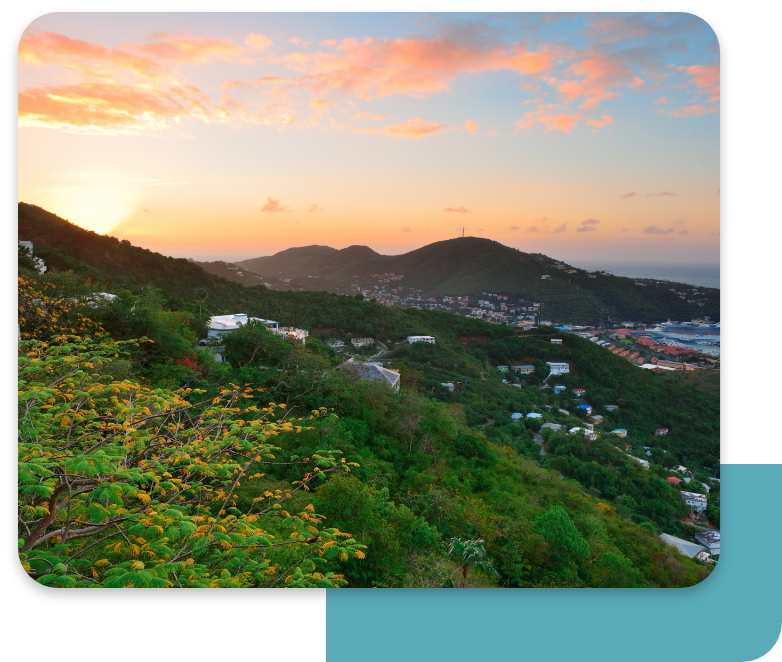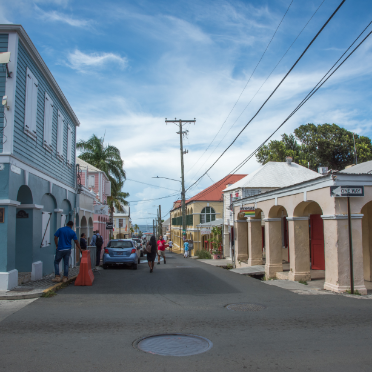Federal Programs
Overview
The Federal Programs Division has oversight responsibilities for virtually all of the VIHFA’s programs/activities which are federally-funded or which are administered by any federal entity. The major program areas under the jurisdiction of the Federal Programs Division included the HOME Program, the Community Development Block Grant (CDBG) and Program to Emergency Solution Grant (ESG).
Community Development Block Grant- CV (CDBG-CV) and Emergency Solutions Grant -CV (ESG-CV) and the American Rescue Plan program – HOME-ARP that are currently administered under the Federal Programs Division.


Community Development Block Grant Program
The Community Development Block Grant (CDBG) Program was established by the Housing and Community Development Act of 1974, as amended. The Act consolidated previously existing categorical grant programs into a single block grant which is awarded to eligible localities throughout the states and also the insular areas, based on a formula allocation.
CDBG is under the jurisdiction of the Department of Housing and Urban Development (HUD). The VIHFA administers the program locally. CDBG has as its primary objective the development of viable urban communities through the provision of decent housing, suitable living environment, and expanded economic opportunities.
CDBG funds are sub-awarded to non-profit and governmental entities to carry out various programs and projects that primarily benefit low-to-moderate income persons. Each funded project must meet at least one National Objective as follows: (I) prevention or elimination of slums and blight; (II) address an urgent need; and (III) primary benefit to persons of low and moderate income. Benefit to low/mod income persons is where either (1) at least 51% of the area residents are low-income as established by the census map or, (2) the activity benefits a population which is generally presumed by HUD to be low-income, or (3) housing is created that will be restricted to occupancy by households meeting the federal low-income definition, or (4) jobs are created/retained and at least 51% of the jobs will be held by or available to low/mod income residents.
The Territory typically receives an allocation of approximately $1.9M annually. VIHFA is allowed to use up to 20% of the annual allocation program administration expenses. No more than 15% of the grant allocation can be dedicated to public service projects such as after-school programs; the remaining funds must be used for “brick and mortar” projects.
Application Process
A solicitation for proposals is conducted once a year. Applications are generally made available for distribution at VIHFA’s offices on St. Thomas and St. Croix in early January. Notices are published in the local newspapers and electronic media announcing the availability of applications as well as the date(s) of any planned orientation sessions. Applications must be submitted by the published due date in order to be considered for funding.
Program Criteria
Eligible Projects
- In order to be eligible for funding, the project or program must meet at least one of the National Objectives as follows:
- Elimination of slums and blight (including historic restoration to remove conditions that threaten health and safety)
- Elimination or amelioration of situations that threaten health and safety which came into existence not more than 18 months prior to seeking CDBG funds
- Provision of employment or other benefits primarily to persons of low and moderate income
Eligible Activities
- Acquisition
- Clearance, demolition, and removal of a building and/or improvement
- Construction, reconstruction, rehabilitation of community facilities, residential or non-residential buildings, or industrial buildings
- Infrastructure repairs or improvements
- Removal of architectural barriers
- Planning & survey (also architectural costs)
- Provision of public services (e.g., after-school programs, soup kitchens, substance abuse services, recreational activities, crime prevention services)
Forms & Applications
Contact
For more information or questions regarding the CDBG Program, please contact Jennifer Jones, CDBG Program Manager at (340) 772-4432 ext. 2242 in St. Thomas or Ms. Kalimah Henry, Associate Planner II (340) 772-4432 ext. 3227 on St. Croix.

Emergency Solutions Grant
The Emergency Solutions Grant (ESG) was created under the Homeless Emergency Assistance and Rapid Transition to Housing Act of 2009 (HEARTH Act). The program replaced the former Emergency Shelter Grant. The ESG funds are awarded to eligible localities throughout the states and also the insular areas, based on a formula allocation. The ESG is under the jurisdiction of the Department of Housing and Urban Development (HUD). The VIHFA administers the program locally.
The focus of the ESG is providing assistance to assist persons who are literally homeless or at risk of homelessness to quickly regain stability in permanent housing.
The Territory expects to receive an allocation of approximately $150,000 annually. VIHFA is allowed to use up to 7.5% of the annual allocation program administration expenses. In accordance with federal regulations, no more than 60% of the annual grant allocation can be sub-awarded for emergency shelter and street outreach activities.
Application Process
A solicitation for proposals is conducted once a year. Applications are generally made available for distribution at VIHFA’s offices on St. Thomas and St. Croix in early March. Notices are published in the local newspapers and electronic media announcing the availability of applications as well as the date(s) of any planned orientation sessions. Applications must be submitted by the published due date in order to be considered for funding.
Emergency Solutions Grant 2020 Applications
The Virgin Islands Housing Finance Authority (VIHFA) announces the availability of the Emergency Solutions Grant (ESG) 2020 grant year applications.
ESG is a HUD formula-allocation grant, which provides funding to: (1) engage homeless individuals/families living on the street; (2) improve the number and quality of emergency shelters and transitional housing facilities for homeless individuals/families; (3) provide funding for the operation of these shelters; (4) provide essential services to shelter residents, (5) rapidly re-house homeless individuals/families, and (6) prevent homelessness. Eligible activities include street outreach (essential services related to connecting unsheltered homeless with emergency shelter, housing and other critical supportive social services); shelter rehabilitation/renovation, operations (maintenance, rent, utilities, furnishings), data collection, and homeless prevention/rapid re-housing assistance.
In response to the COVID crisis, this year the Territory is receiving a supplemental allocation of ESG funds under the CARES Act. These special funds (ESG-CV) shall be used specifically to prevent, prepare for, and respond to the coronavirus (COVID-19) pandemic among persons who are homeless or receiving homeless assistance or expand homeless assistance/homelessness prevention activities to mitigate the impacts of COVID-19. Funded COVID mitigation activities should be ready to start by August 1, 2020.
Eligible applicants include non-profit and faith-based organizations, and governmental agencies.
Prospective applicants for ESG and/or ESG-CV funds may request an application by contacting Mrs. Brenda Harrigan-Walwyn via e-mail at bhwalwyn@vihfa.gov with a copy to Ms. Janine Hector at jhector@vihfa.gov.
A virtual technical assistance workshop will be held via GoToWebinar beginning at 4:30 PM on Thursday, May 21, 2020. Potential applicants are strongly encouraged to attend the scheduled technical assistance workshop. Log-in information will be provided upon requesting an application.
Application due date: Friday, June 5, 2020 at 3:00 PM. No extensions of the due date will be granted.
For additional information contact:
Ms. Janine Hector, Director of Federal Programs, at (340) 772-4432 ext.3234.
PDF icon 2020 esg application ad final version.pdf
PDF icon Welcome to the 2020 ESG Technical Assistance Workshop.pd
Program Criteria
Eligible Applicants
- Applicant must be a registered non-profit or faith-based organization in good standing
- Applicant must have a Tax Identification Number (TIN) and also a Dun & Bradstreet registration (DUNS#)
- Applicant organization’s Board of Directors (or and Advisory Committee thereof) must include a documented current or formerly homeless person
Eligible Activities
- Emergency Shelter - Rehabilitation/conversion of buildings for use as emergency shelters for the homeless; shelter operational expenses such as maintenance, rent,
utilities, insurance; and provision of essential services such as emergency health services and ground transportation for persons housed in emergency shelters - Street Outreach - Essential services for chronically homeless (unsheltered) persons. Eligible activities include engagement, case management, emergency health
services, and ground transportation - Homeless Prevention/Rapid Re-Housing - Services for qualified individuals and families who are literally homeless or at imminent risk of homelessness. Eligible activities
include intake services, housing search & placement, rental assistance, and case management relative to assisting clients - Housing Management Information System (HMIS) - Qualified expenses associated with the administration of the HMIS (HMIS lead agency only) and also expenses
(training, data entry, etc.) associated with the participation in the HMIS (ESG subrecipients).
Contact
For more information or questions regarding the ESG Program, please contact Ms. Janine Hector, Director of Federal Programs, at (340) 772-4432.

Continuum of Care (CoC)
Each year, the U.S. Department of Housing and Urban Development (HUD) issues funding opportunities under the Continuum of Care Grant Program. The Continuum of Care Grant Program is designed to promote a community-wide commitment to the goal of ending homelessness; to provide funding for efforts by non-profit providers, state, and local governments to quickly re-house homeless individuals, families, persons fleeing domestic violence, and youth while minimizing the trauma and dislocation caused by homelessness; to promote access to and effect utilization of mainstream programs by homeless individuals and families; and to optimize self-sufficiency among those experiencing homelessness. The local Continuum of Care (VI-CoC) is required by HUD to submit a consolidated application for funding for renewal and/or new homeless services projects seeking funding under the CoC Grant.
Resources and Helpful Links

Homeownership Assistance Funds Program
Eligible residents can receive up to $65,000 to cover outstanding expenses ranging from delinquent mortgage loans, property taxes, hazardous insurance, and outstanding homeowner association/condominium fees under the Homeowner Assistance Program. A total $8.5 million has been allocated to the territory – approximately 60-percent of which must assist homeowners with incomes at or below 100 percent of the area medium income.
Eligible residents may apply for assistance through the following programs:
- Mortgage Reinstatement Program (maximum assistance $65K)
- Mortgage Principal Reduction Program (maximum assistance $65K)
- Foreclosure Prevention Program (maximum assistance $65K)
- The Mortgage Payment Assistance Program (maximum assistance $30K)
- Delinquent Homeowner Association (HOA)/ Condominium Fees Program (maximum assistance $15K)
- Delinquent Property Taxes Program (maximum assistance $10K)
- Hazard Insurance Program (maximum assistance $5K)
This project is being supported, in whole or in part, by federal award number HAF00039 awarded to the U.S. Virgin Islands by the U.S. Department of the Treasury.
Eligibilty
To be eligible for assistance:
- Properties must be located in the US Virgin Islands,
- The applicant must currently own and occupy the property as their primary residence
- Household income cannot exceed 150% of the Area Median Income (AMI) based upon US Department of Housing and Urban Development (HUD) income data (click here for income limits per island),
- Homeowners must describe and attest to financial hardship after January 21, 2020, such as job loss, a reduction in household income, incurred significant costs for health care or experienced other financial hardship due, directly or indirectly, to Covid-19
Eligible property types include single-family properties, condominium units and one-to-four-unit properties where one of the units is the applicants primary home. The eligible mortgage types that can qualify for assistance include first mortgages, second mortgages and in all cases, the principal mortgage must not exceed the maximum conforming loan limit as determined and adjusted annually under section 302(b)(2) of Federal National Mortgage Association Charter Act (12 U.S.C. 1717(b)(2)) and section 305(a)(2) of the Federal Home Loan Mortgage Corporation Act (12 U.S. C. 1454 (a)(2)).
How To Apply
- Go to the HAFP Online Application at: https://www.zoomgrants.com/gprop2.asp?display=&donorid=2431&rfpid=4585&propid=&scrollto=addressauser
- Create a Zoom Grants account to begin submitting information.
Contact
Contact our call center at (888) 597-7188 or email us at hafp@vihfa.gov for more information on eligibility and application assistance.
HAFP Online Application
Contact
If you have any questions regarding Federal Programs, please call the St. Croix staff at (340) 772-4432, St. Thomas at (340) 777-4432 or contact us.
• Ms. Janine Hector, Director of Federal Programs – St. Croix
• Ms. Chivonne Moorhead, Assistant Director of Federal Programs, St. Croix
• Ms. Kalimah Henry, CDBG Associate Planner II – St. Croix
• Ms. Jacqueline Carr, Federal Programs Coordinator – St. Croix
• Ms. Jennifer Jones, CDBG Program Manager - St. Thomas
• Ms. Samalia Wyllis, Associate Planner I – St. Thomas
